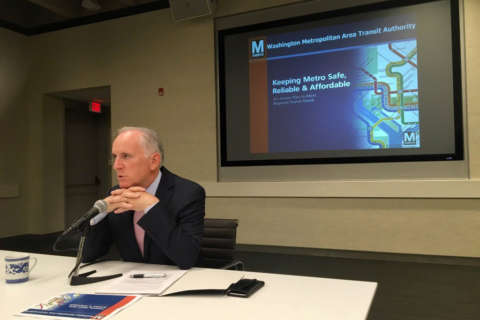WASHINGTON — The outlines of new regional taxes dedicated to funding Metro’s massive maintenance needs inched forward Wednesday afternoon.
The Metropolitan Washington Council of Governments approved eight principles for its Metro Strategy Group to use when creating a region-wide plan by September to provide full funding for Metro.
The principles support some type of dedicated Metro funding that would be stable enough to back bonds. The principles do not address how much money is needed, and they push for more Metro reforms before any final decisions are made on a total.
Other points include a greater push for more federal funding; a suggestion that the region should try to avoid rewriting the interstate agreement that established the system, the Metro Compact; and a suggestion that annual growth in contributions from local governments should be capped at 3 percent per year.
Metro General Manager Paul Wiedefeld proposed that cap in his own plan unveiled in April, in which he asked for $500 million in additional dedicated funding each year.
A Council of Governments technical panel recommended $650 million per year to help offset operations and additional maintenance or expansion needs.
Fairfax County Board Chairman Sharon Bulova, who is leading the Metro Strategy Group, said the politicians’ proposals would be finalized in September.
Also in September, former U.S. Transportation Secretary Ray LaHood is scheduled to release a separate report outlining what he hopes is a regional consensus on any changes needed for Metro governance, financial structures and funding.
At Wednesday’s Council of Governments meeting, Loudoun County Supervisor Matt LeTourneau pushed for the strategy group to be more open to revising the Metro Compact, as some Republicans in Virginia’s GOP-led General Assembly have wanted.
Any new taxes, even if limited to local areas, would need to be approved by Annapolis or Richmond to take effect in suburban Maryland or Virginia.
A member of both the Arlington County and Metro boards, Christian Dorsey, said the most important part of these principles is the deadline: summer 2018.
Wiedefeld has warned that if new funding is not approved in the General Assembly sessions this winter, money will not be in place in time to help with potential capital or operating budget shortfalls that are forecast to hit by January 2019.






